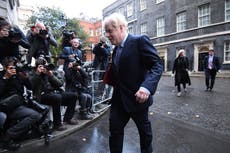Who are the key players in the power struggle engulfing No 10?
Shake-up of the prime minister’s inner circle leaves him without two of his closest aides
Your support helps us to tell the story
From reproductive rights to climate change to Big Tech, The Independent is on the ground when the story is developing. Whether it's investigating the financials of Elon Musk's pro-Trump PAC or producing our latest documentary, 'The A Word', which shines a light on the American women fighting for reproductive rights, we know how important it is to parse out the facts from the messaging.
At such a critical moment in US history, we need reporters on the ground. Your donation allows us to keep sending journalists to speak to both sides of the story.
The Independent is trusted by Americans across the entire political spectrum. And unlike many other quality news outlets, we choose not to lock Americans out of our reporting and analysis with paywalls. We believe quality journalism should be available to everyone, paid for by those who can afford it.
Your support makes all the difference.Boris Johnson has lost two of his closest aides after a behind-the-scenes power struggle in No 10 involving the government’s Vote Leave faction erupted into open warfare.
The shake-up of the prime minister’s inner circle started on Wednesday when Lee Cain, Mr Johnson’s director of communications, announced he was quitting.
He had been offered the post of chief of staff, but a backlash among senior Tories ultimately led to his departure from No 10.
Dominic Cummings, Mr Johnson’s top adviser who is seen as the most powerful figure in Downing Street, was said to be unhappy at the way his friend had been treated.
A day later and amid swirling rumours of more dissent among the so-called “Brexit Boys”, it emerged that Mr Cummings was also expected to leave his role by the end of the year.
While it remained unclear exactly when he would step down, Mr Cummings said his position had not changed since a blog post in January when he wrote that he hoped to make himself “largely redundant” by the end of 2020.
News of Mr Cummings’s departure came with the BBC quoting a Downing Street source saying he would be “out of government” by Christmas.
But that timetable was brought forward dramatically on Friday afternoon when, cardboard box in hand, he walked out of No 10 for good.
Both he and Mr Cain were among a Vote Leave faction that Mr Johnson brought into government when the former mayor of London won the 2019 general election, alongside Cleo Watson, head of the prime minister’s priorities and campaigns. She served as head of outreach for Vote Leave, having previously campaigned for the Liberal Democrats in the 2005 election campaign before switching to the Tories in 2010.
Brexit adviser and former head of research at Vote Leave, Oliver Lewis, and data guru Ben Warner – who was a key figure in the modelling programme used in the 2016 referendum as well as the Tories’ private election computer model in 2019 – make up the remainder of the team of senior advisers with links to the Brexit campaign. Those three figures are believed to be staying put.
Chief among the resistors to Mr Cain’s promotion was said to be the PM’s fiancée, Carrie Symonds – a former Tory press officer and now mother to their six-month-old son, Wilfred – who is said to enjoy increasing influence within the party.
Ms Symonds is reported to have had concerns about Mr Cain’s promotion in the context of broader accusations that the government was “blokey” and a “boys’ club”.
She found an ally in Allegra Stratton, the former broadcaster brought in to host televised No 10 news conferences from next year, who was also said to have objected to Mr Cain’s appointment, which would have meant he was one of just a handful of people with direct one-to-one access to Mr Johnson.
A former broadcast journalist, Ms Stratton left television for politics in April when she entered the Treasury as Chancellor Rishi Sunak’s communications chief.
Mr Cain – a former journalist at titles including The Sun and The Mail on Sunday, who also worked in television at This Morning – memorably dressed up as a chicken to embarrass the then Conservative leader David Cameron while at the Daily Mirror.
He is said to be disliked by many on the Tory backbenches – not least for his much-criticised communications strategy during the coronavirus pandemic.
Mr Cain will be succeeded by James Slack, the prime minister’s official spokesman who also held the post under Theresa May.
Unlike Mr Cain who is a political special adviser, Mr Slack, a former Daily Mail journalist, is a member of the permanent Civil Service.
Mr Slack is described as more softly spoken than the outgoing head of communications, and is being welcomed by some within the party as a chance to “reset” the government after a tumultuous few months for both Mr Johnson and the country.


Join our commenting forum
Join thought-provoking conversations, follow other Independent readers and see their replies
0Comments